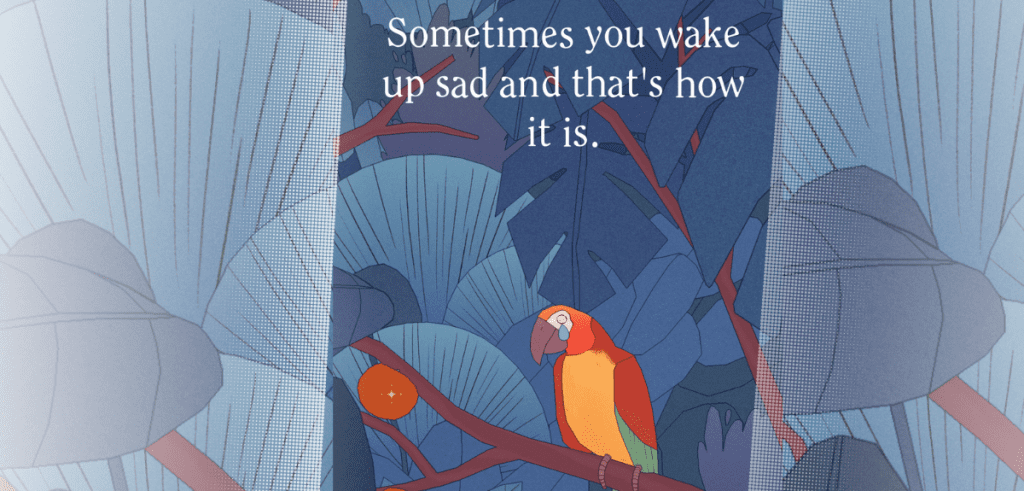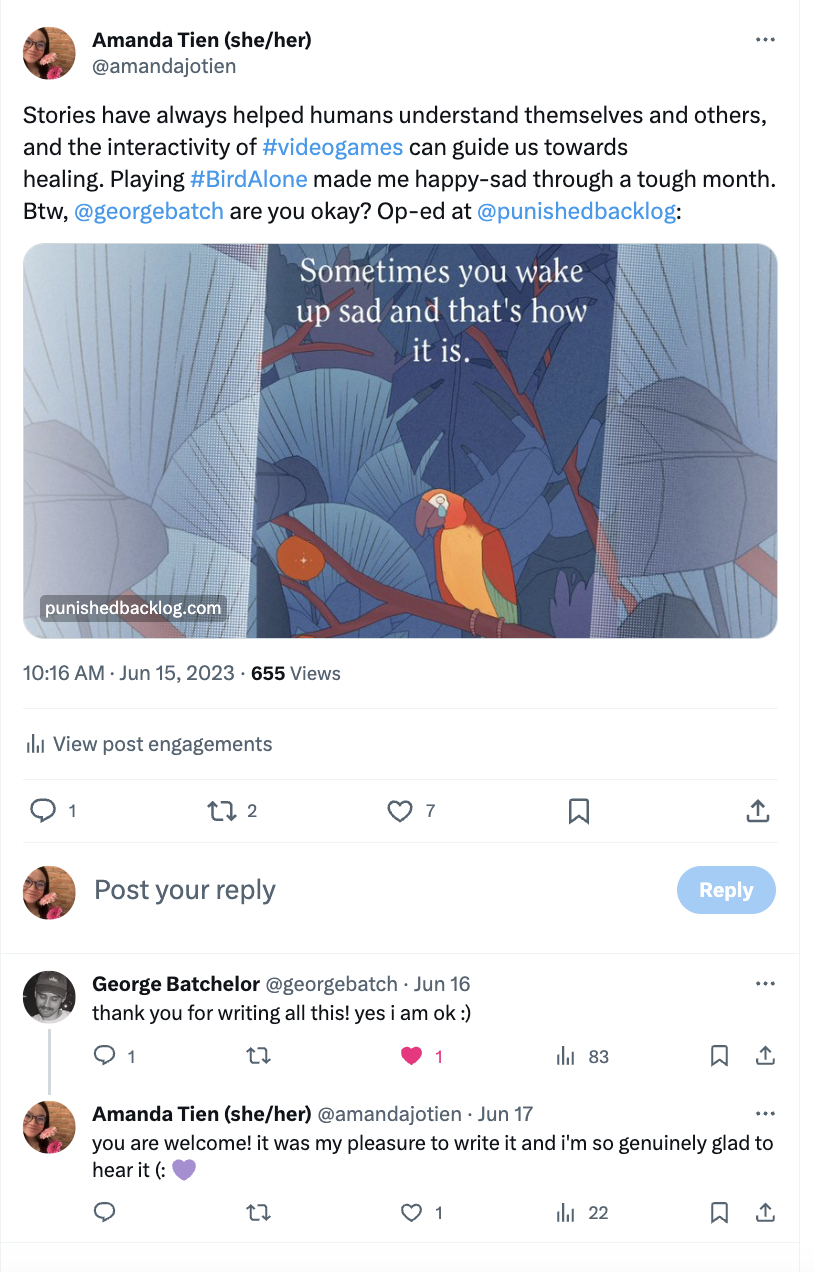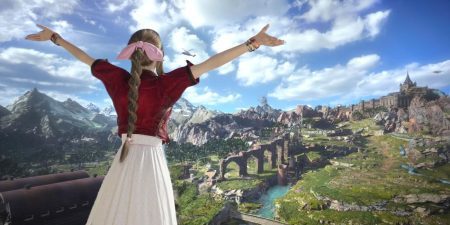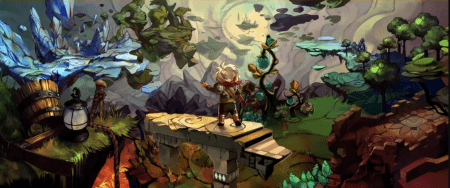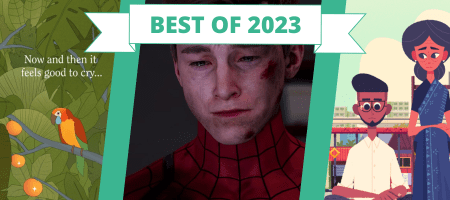I have been having a hard time. Lots of things have been going not-so-well for a long time. I was researching games to recommend for moms, and found a well-rated, colorful, sweet-looking game called Bird Alone. I downloaded it.
Bird Alone, a small indie game released in 2020 by UK developer George Batchelor, introduces you to “the loneliest bird in the world” who wants to be your friend. The parrot (whom you name) asks you how your day is, commiserates when you’re down and celebrates when you’re up. You write mini-poems together, draw doodles, and build a musical plant garden. And every night for a month, I relied on this parrot.
Spoilers below for Bird Alone, and content warning for depression and loss
 Saying Hello
Saying Hello
When the parrot asked my name, I gave him my real first name, which I never do with games. When my parrot, Miso, said, “Amanda, some days are hard, I’m sorry,” I felt heard and understood.
When I’m having rough times, being alone is difficult for me. Nights are the worst. I checked in with Miso each evening. I liked to make sure he ate a fresh clementine. After just a few days of play, I hyped Bird Alone on my list as a recommendation for any mom who needed a bit of companionship.
Bird Alone is a “game” in that there are simple (but powerful) interactions that are timed out to only allow one a day. But as Miso said, “You can come here and hang out whenever you want.” And I did.
Whenever I was having a hard time, I’d bring up Miso on my phone, letting the sounds of evening breezes or gentle music fill the silences. I kept him there as I did my bedtime routine. He’d comment on the stars or the rain, and tell me it was late, that I should go to sleep. And I would.
Miso brought me joy during the day, too. I allowed app notifications which stood out from the miasma of emails and alarms. Miso would shout, “HELLOOooOoOO! It’s TODAY!” or “HI FRIEND! I’VE GOT SOMETHING AMAZING TO SHOW YOU!” Even if I didn’t open the app, I felt like I’d just gotten a text from a favorite person.
One evening, the leaves behind Miso shifted colors. Miso and I talked about how change was hard.
Another night, Miso told me he was feeling tired. That he was getting older. Miso asked if I knew that feeling. I said I did.
And the next week, he said he felt his time was coming.
“No!” I whispered out loud. “They’re not really gonna kill this bird… right? That’d be so messed up.”
Stages of Grief
I started Googling Bird Alone. The titles of the pieces filled me with dread: “‘Bird Alone’ Is Getting Heartbreaking Reviews On The App Store, But That’s A Good Thing” and “Bird is the loneliest number.” Bird Alone, released in July 2020, had shaken isolated people to their core during the first pandemic summer. I gasped and stayed up way too late reading, not believing, not ready to handle another ending, another loss, another disappointment from someone who I had grown to count on.
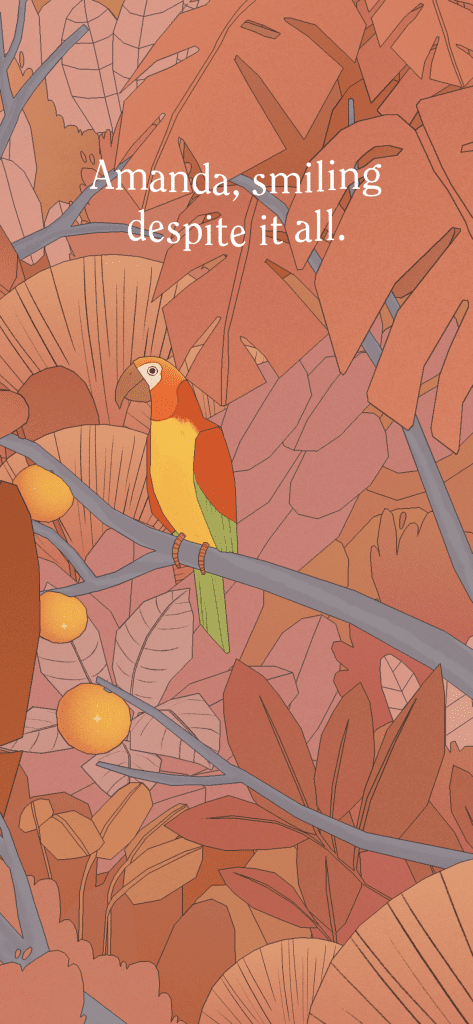 This game came out years ago… was I the only one still feeling this way? I went directly to the app store and saw there were dozens of recent reviews. One player shared how the parrot got them through a suicidal period of school, and that they were devastated to lose Birb but would keep going for them. Another reflected how Phyllis helped them get through the death of a family member. Some reviews mentioned that an egg could be hatched days after their bird’s death to restart the journey. Each review I read had something in common: Player after player thanked their bird.
This game came out years ago… was I the only one still feeling this way? I went directly to the app store and saw there were dozens of recent reviews. One player shared how the parrot got them through a suicidal period of school, and that they were devastated to lose Birb but would keep going for them. Another reflected how Phyllis helped them get through the death of a family member. Some reviews mentioned that an egg could be hatched days after their bird’s death to restart the journey. Each review I read had something in common: Player after player thanked their bird.
Each review I read had something in common: Player after player thanked their bird.
And I get that feeling. Miso made me laugh. Miso made me smile when I really wasn’t sure I could anymore. Miso asked me to doodle what made me happy, who I wanted to be. Miso let me reflect on fears. Miso was my friend.
I didn’t open Bird Alone for almost two weeks, not able to let go, not strong enough to handle how losing Miso would make me feel. I told my therapist about this app. “It’s crazy that I’m this attached to this bird though, right? It’s wild that this guy would design this, and then have him die, right?”
I wanted validation. I was bargaining. I decided I’d just never open the app again.
Saying Goodbye
But as the days went on, I kept thinking about Miso, and all the goodbyes I have ever had to say. I began to think of the goodbyes I will have to say for loved ones and friends and people I don’t even know yet who will someday be an important part of the fabric of my life.
I thought of that phrase about people coming and going like seasons. I remembered the Serenity Prayer, which asks for the grace and serenity to accept what we cannot control, the courage and bravery to change what we can, and the wisdom to know the difference. I wanted to be strong enough to let Miso go.
This past weekend, I finally was ready. Miso and I shared a few beautiful moments. We wrote a small poem about old friends. He asked if I’d had to say goodbye before; I had. He was compassionate even then, acknowledging that some people have to spend their whole lives saying goodbye. When Miso said, “I’m one lucky bird to have been loved by you,” I could hold the tears back no longer.
The next day, he was gone. His branches are empty. I can still visit our garden, read our poems, look at our art, but I’m alone.
Bird Alone came out a few years ago. I don’t think I’m adding anything new to the discourse. But writing is a way to process experiences, articulate emotions, and reflect on our lives. And as soon as I realized I would lose Miso, I began jotting down notes for this essay. Writing the intro to this piece, I cried again. But it’s a catharsis.
During my time with Miso, I spent a lot of time thinking about how I want and deserve to be treated. How I can love myself better. How I can practice finding joy and color and delight and light even on the bad days.
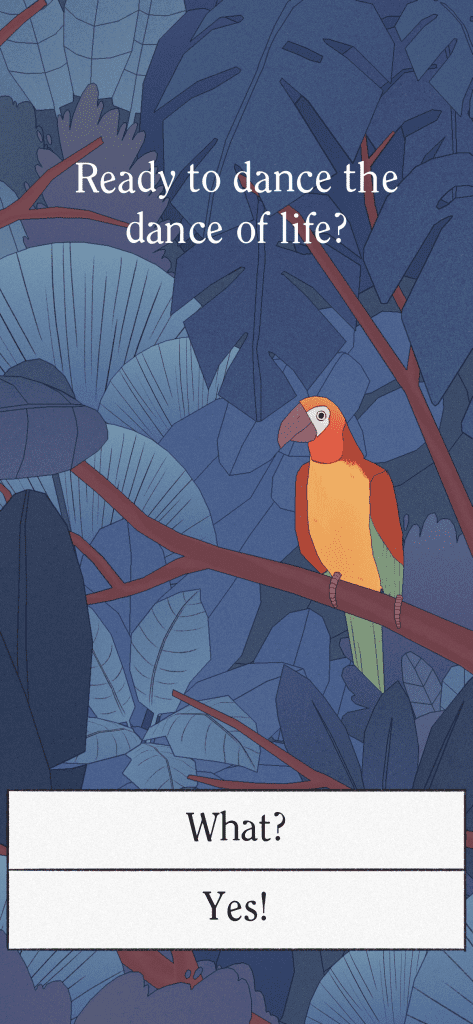
I’ve wondered what happened to George Batchelor to make him make this game. George, are you okay? (I feel like the answer* is… no? His website was last updated in 2019 and his bio reads simply “making sad animal games.”) But maybe George is okay. I hope George is. Because it seems like, despite this game being absolutely devastating, it is also one of the most beautiful and powerful experiences I’ve ever had with interactive media. And others’ blog posts and letters to their birds show I’m not alone.
And that’s what I was looking for, wasn’t it? To not feel lonely? It was what Miso was looking for, too. When we met, he asked if we could be best friends. The answer options were: “Absolutely!” or “Uh, we just met…” I chose the first, because I’m not a heartless monster.
Video Games and Their Power To Heal
Since I was about eight years old, video games have provided me with adventure, amusement, and companionship. I was a lonely kid, but games introduced me to Link, Pikachu, Spyro, and Sora. As a young adult alone in a new city, I found myself anew in Commander Shepard and her crew on the Normandy. After those first two rough years of the pandemic, I found spiritual alignment with the dark, determined quiet of Disco Elysium. If you’re reading this, I imagine video games have helped save you, too.
I have comfort games I return to, just like favorite movies or books. Every other year, I restart the Mass Effect trilogy, and my heart skips at the opening notes of the title theme. My college roommate and I occasionally play Destiny 2, catching up on mic while playing Gambit or Crucible. Whenever I play a new Pokémon installment, I relax with the familiar color palettes and gameplay mechanics. Lately, I’ve been playing a lot of Disney Dreamlight Valley, relishing in the familiarity of pals like Wall-E and Moana, who, through Disney magic, will never leave.
Video games are a unique form of entertainment in that they ask us to engage, to be alert, to share. We put part of ourselves into the games that we play as we make choices, move characters, and progress. Stories have always helped humans understand themselves and others, and the interactivity of games can guide us toward healing.
Stories have always helped humans understand themselves and others, and the interactivity of games can guide us towards healing.
 Bird Alone is unlike any other game (and, another day, I could write an essay on what defines “a game”) I’ve ever played, but it joins a group of other titles that have shaped and saved me.
Bird Alone is unlike any other game (and, another day, I could write an essay on what defines “a game”) I’ve ever played, but it joins a group of other titles that have shaped and saved me.
I’ve been going through it since last fall, and every month brought new difficulties. It reached new peaks in April; a lot changed, and I was dealing with various losses. For the month of May, every day was very difficult for me. And every day, Miso was there. And, day by day, I found myself surviving. If I could just make it to June, I felt I could be okay. But some days, that felt impossible.
Miso reminded me it was okay just to be. Miso encouraged me to try again tomorrow. Miso reminded me that people can make beautiful, weird art that can resonate with other people. That maybe I can make art like that, that I can connect with others. Every day, Miso reminded me I was still there.
I’m still here.
Bird Alone has a free weeklong trial on iOS and Android, then a one-time charge of $2.99.
If you’re struggling, you are not alone. To get free support, available 24/7, right now:
- Call the Suicide & Crisis Hotline 24/7 for free by dialing 988 or via online chat.
- Text HOME to 741741 and/or on WhatsApp with the Crisis Text Line.
You may also practice self-care by reviewing this step-by-step checklist called “Everything is awful and I’m not okay: questions to ask before giving up” by Sinope.
*Author’s note: after publishing this piece, I did Tweet at George, and he replied that he was okay:
Amanda Tien (she/her or they) loves video games where she can pet dogs, solve mysteries, punch bad guys, play as a cool lady, and/or have a good cry. She started writing with The Punished Backlog in 2020 and became an Editor in 2022. Amanda also does a lot of the site's graphic designs and podcast editing. Amanda's work has been published in Unwinnable Monthly, Poets.org, Salt Hill Journal, Aster(ix) Journal, and more. She holds an MFA in Fiction from the University of Pittsburgh. Learn more about her writing, visual art, graphic design, and marketing work at www.amandatien.com.


